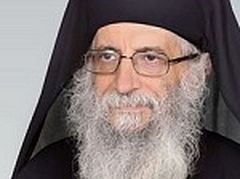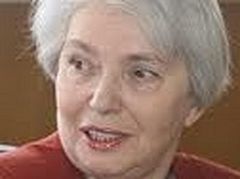The Munich Olympic Games that took place exactly half a century ago are memorable to many people. It had a history-breaking victory of the Soviet Union men’s basketball team over the previously undefeated US team, with its legendary pass by Ivan Edeshko and the perfect shot by Alexander Belov a split second before the final buzzer, and a famous performance by the gymnast Olga Korbut… Unfortunately, it is also remembered for the terrorist attack by Palestinian fighters, members of the group “Black September,” who killed eleven members of the Israeli team.
Archpriest Nikolai Artemov—now a priest of the Cathedral Church to the New Martyrs and Confessors of Russia in Munich, but at the time a young member of the National Alliance of Russian Solidarists (NTS)—at the time of the Games, was meeting with Soviet athletes and tourists to distribute printed materials banned in the Soviet Union. He saw the attack on TV, but it so happened that many years later, he was assigned to bless one of the apartments where this atrocity took place.
Fr. Nikolai spoke to Pravoslavie.ru about funneling the Bible and books by Solzhenitsyn behind the “Iron Curtain,” the tragedy in Munich, and how he realized that prayer soaks up blood and death.
People started talking nonsense about Solzhenitsyn, but we later realized they were actually checking us out
 Archpriest Nikolai Artemov There were various publishing houses in the Russian Diaspora all over the world. There weren’t a lot of them, neither they were extremely powerful, but their job was to spread the free Russian word—as well as with the help of the NTS that I belonged to.
Archpriest Nikolai Artemov There were various publishing houses in the Russian Diaspora all over the world. There weren’t a lot of them, neither they were extremely powerful, but their job was to spread the free Russian word—as well as with the help of the NTS that I belonged to.
Certainly, these were religious people, I haven’t met any atheists there. For example, Frankfurt, the location of the Posev Publishing House, where at first my parents and later my sister and I had worked, had a church. It was housed not in a Baroque, but a “barrack-style” building, as we used to call it—that is, it was located in a barrack. The Russians took several barracks to pieces and set up a two to three-story building with a dome and an additional wing. Our whole family attended that church. Later on, Vladimir Yaromirovich Gorachek, the main publisher of Posev and Vladyka Agapit’s father, together with the Count, Archpriest Leonid Ignatiev, became major organizers of the construction of a stone church in Frankfurt—the one that is still standing today.
As for the free Russian word, the idea was to distribute literature not only among émigrés, but also send it to the Soviet Union. In particular, the Solidarists were doing it together with young people from Italy, France, the Flemish regions, Norway and other areas who also actively participated in this movement and often traveled there. We also often sent books and magazines with the Soviet sailors in Rotterdam and other ports.
When the 1972 Summer Olympics were organized in Munich, it was only natural that we disseminate literature there as well. So, once we were done with the NTS camp in Italy, we got in our cars and headed there. Some of us were invited to spend a night with the family of renowned philosopher Semyon Ludvigovich Frank. My mother was friends with them when they all lived in pre-war Berlin. It was painful to learn that our arrival literally coincided with the death abroad of Victor Semenovich, the Franks’ eldest son. We were visiting with his mother Tatiana Sergeyevna when she received the news. Later, I stayed with my friend at his flat and attended the panikhida in his memory.
In the following days, we traveled around Munich meeting Russian (that is, Soviet) citizens. As far as I know, Russia sent about five hundred tourists and accompanying persons, or “nannies,” as we usually described them—in other words, KGB agents.
The local authorities in Munich had no idea how much they helped us. During an official meeting at the mayor’s office, they presented the bags to everyone who came to the Games: this bag had a sign “XX Olympic Games Munich-1972” in German at the front and the same sign, but in other languages, like English, Chinese, Polish, and of course, Russian, for the Russians, on its opposite side. The Soviet athletes and tourists used them for shopping in the local stores. So, you walked around the downtown and you saw this bag. But even without it, you could tell our people by their dress—besides, they usually walked in groups of two or more people. They’d stand beside the shopping windows discussing something… But those bags really helped us recognize them from a distance.
Apart from that, we met athletes who walked around town and the Olympic village between competitions in the busy shopping areas, where it was relatively easy to catch them.
Typically, we’d speak in a roundabout way: “Hello! Where are you from, what do you do?” We had all kinds of encounters; some would simply step back from us, whereas others, on the contrary, would get interested. My friend and I had an unforgettable meeting with two men at the Olympic Park. We had with us not only the pocket-sized edition of One Day in the Life of Ivan Denisovich and Cancer Ward, but other writings as well, printed on the finest lightweight paper. We asked them if they had read anything by Solzhenitsyn. They started talking such impossible nonsense about him!
My friend and I fought back as effectively as we could, leading a “politically correct discussion” (laughs). But what’s interesting is that fifteen minutes later, once they were done talking to us according to the “required” Soviet script, our counterparts suddenly changed their tune and asked: “So okay guys, do you really have Solzhenitsyn?” They suddenly went off on a tangent and began asking us all kinds of interesting questions. It turned out that, at the beginning, they simply tested us to make sure we weren’t KGB spies. As a result, we gave them a considerable amount of all kinds of publications.
There was another encounter when I figured the man out and asked him whether he was interested in getting any books. He responded: “Look, I’ve been waiting for you for three days, I have a list from the university in Alma-Ata. I need this and this.” I said, “Good. But I don’t have them with me.” Eventually, I went to the warehouse and the next day gave this man everything he had longed to have.
Sure, all of us were religious people, but we also distributed other books—not only spiritual writings. Apart from the already mentioned Solzhenitsyn, we also had Bulgakov’s The Master and Margarita that included all censored sections marked in cursive; the same with the Babi Yar by Anatoly Kuznetsov, or Andrey Sakharov’s Reflections…, in addition to periodicals, in particular Posev magazine. Without a doubt, we also distributed a lot of church materials: Holy Scripture, books by Fr. Alexander Elchaninov from France, apologetic brochures by Bishop Nathaniel, prayer books, even the Books of Needs and service books. In particular, “YMCA Press” publishing house in Paris reprinted the Book of Needs from 1928 that was published by St. Job of Pochaev monastery in Ladomirovo, Slovakia, where our metropolitan Laurus (Skurla) came from.
Entire classes of children from West Germany used to go on trips to Russia. If they agreed, and their parents and teachers didn’t mind, we would hand a Bible to each one of them. Theoretically (that is, officially), the Bible could not be imported to Russia. Of course, it was occasionally confiscated at the customs control, but they could also fend it off. In such cases, people would typically retort, saying: “We are Christians and we are learning to read in Russian.”
They would later go to tour the Holy Trinity-St. Sergius Lavra, for example, and leave these books anywhere they went. For example, you sit down on a bench, then you get up and leave a book behind. Someone would surely pick it up.
But even if they were confiscated at customs, these books weren’t always lost. After all, they had a certain value. I remember how comforting it was to find out from the newspapers that a search recovered around twenty bags full of books from the basement of a house belonging to the chief of the Sheremetyevo Airport Customs Office. Of course, we felt badly for him and the books. It appeared, though, that “manuscripts don’t burn” (as Bulgakov wrote) and apparently, “books don’t disappear.” This happened in 1973. Then another there was similar incident. At the same time, the Soviet media complained about and described the tricks used by sailors to smuggle unauthorized literature.
The books by Archbishop Averky (Taushev), Pastoral Theology by Fr. Konstantin (Zaitsev), The Philokalia, and many other publications from Jordanville ended up, in a variety of ways, behind the “Iron Curtain” and later, in the 1990s. The people would say how essential they to preserving the faith in Russia.
Apparently, rather purposeful and extensive work was going on at different levels, and not only at the Munich Olympics. To the extent possible, it was hidden so that the KGB would not find out about it. We also received feedback at different levels. For example, there were people to whom we sent couriers.
One such courier was the daughter of a French consul named Zhenya, or Genie in French, who spoke perfect Russian. She delivered books to the Soviet Union, to a man who was held in a psychiatric ward for his faith. He was drugged, and later his friend would share how, upon his return home, he’d cry at night that he wouldn’t fall away from God.
This Zhenya opened a suitcase full of religious publications in front of him. A spark flew between the two—her name is Zhenya and he’s also Zhenya. They ended up getting married, and over time he, now Father Eugene Safronov, served as a priest in Berlin.
Or, there is another story. A woodcarver in Kustanai was cleaning a church and stumbled upon one of Vladyka Nathaniel’s apologetic brochures I have already mentioned. It’s address was our Pochaev Monastery in Munich. He brought this brochure to a nun who told him, yes, there is such a Church Abroad. It happened in 1981 or 1982, so he wrote us a letter, and in 1989 he came to us by invitation and built the iconostases and altar tables in many churches of our diocese.
Of course, we couldn’t deliver very many books, but they would later be photocopied in the Soviet Union. In particular, Fr. Alexander Pivovarov, Victor Burdin and their colleagues, I believe, from Novosibirsk or Tomsk, got access to a copying machine, forged a key to unlock it, manipulated its copy counter and copied bagloads of this literature. These people were later arrested and imprisoned, while we, in the West, defended them, writing articles in their support in the same Posev.
Later on, we used cassettes, and they were so much easier to copy. In my studio, I would make recordings of various texts and prayers, including two Canons at the Departure of the Soul. It turns out these recordings are still in use today. Besides, the Prayer Rule Before Communion I recorded back in 1984 is still widely used in America, Russia, and other places.
I can reveal a little secret to you. The Irmos of the Ninth Ode in this Canon was recorded incorrectly; my wife and I recorded it together (for four parts), and at some point, she left to attend to our youngest daughter who was two at the time. So, I had no other choice but to play a fragment recorded for the three canons. Forgive me for that error. As for the Canon at the Departure of the Soul, I was singing all four parts by myself. Someone asked me later: “This choir sounds a bit strange; their voices all sound alike!” (laughs).
Sure, a lot of things have changed since then and we have long witnessed this process reversing its course: books originally published by our publishing houses are now openly printed in Russia and then arrive here. It is very important for us, because due to our modest means we would have been unable to do it on the scale it is done these days. It helps us to maintain our Russian roots and connection with the Motherland, so we can say that we are working hand in hand. That said, this “hand” on our side is quite small.





